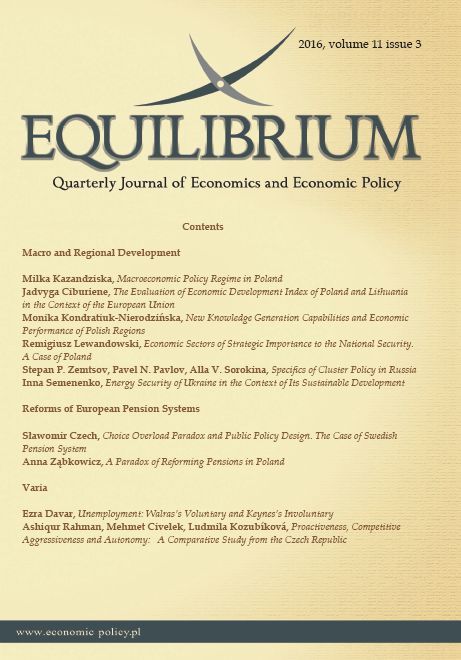Specifics of cluster policy in Russia
DOI:
https://doi.org/10.12775/EQUIL.2016.023Keywords:
cluster policy, Russian regions, innovations, quality of management, cluster management teamAbstract
The article presents the results of management quality survey in Russian clusters that reveals specifics of cluster support policy in Russia. We compare 22 Russian clusters, supported by the Government, using series of indicators measuring cooperation intensity of cluster participants and activity of cluster management teams. We introduce a description of the typical Russian innovative territorial cluster, based on the average values of the indicators. Our analysis revealed that international communications, information about funding and training courses are highly useful tools to improve collaborations among cluster participants. This paper proposes a methodology for measuring cluster performance by the cluster scale index, cluster development index and cluster management efficiency index. In conclusion, we formulate recommendations for cluster policy improvement in Russia, based on our analysis of indicators? correlations and comparison between the results of our research and the similar researches in other countries. This analysis will be useful for researchers and policymakers from countries, where cluster policy has recently become a popular topic.
Downloads
References
Biggiero, L., & Sammarra, A. (2010). Does Geographical Proximity Enhance Knowledge Exchange? The Case of the Aerospace Industrial Cluster of Centre Italy. International Journal of Technology Transfer and Commercialisation, 9(4). DOI: http://dx.doi.org/10.1504/IJTTC.2010.035397.
Borisenko, O. (2012). Development of clusters in Russian Regions. Vestnik MGTU, 15(1).
Chen, D. H., & Dahlman, C. J. (2005). The Knowledge Economy, the KAM Methodology and World Bank Operations. World Bank Institute Working Paper, 37256.
Delgado, M., Porter, M. E., & Stern, S. (2014). Clusters, Convergence, and Economic Performance. Research Policy, 43(10). DOI: http://dx.doi.org/10.1016/ j.respol.2014.05.007.
Europe INNOVA (2008). The Concept of Clusters and Cluster Policies and Their Role for Competitiveness and Innovation: Main Statistical Results and Lessons Learned. Commission Staff Working Document SEC (2008)2637. Luxembourg: European Communities.
European Cluster Excellence Initiative (2012). The Quality Label for Cluster Organisations ? Criteria, Processes, Framework of Implementation. Retrieved from http://www.cluster-excellence.eu/ (8.02.2015).
Häussler, C., & Zademach, H. M. (2006). Cluster Performance Reconsidered: Structure, Linkages and Paths in the German Biotechnology Industry, 1996-2003. SFB/TR 15 Discussion Paper, No. 188.
Ketels, C., Lindqvist, G., & Sölvell, Ö. (2012). Strengthening Clusters and Competitiveness in Europe. The Role of Cluster Organisations. The Cluster Observatory.
Ketels, C. (2003). The Development of the Cluster Concept?present Experiences and Further Developments. In NRW Conference on Clusters Vol. 5. Duisburg. Germany.
Lundequist, P., & Power, D. (2002). Putting Porter into Practice? Practices of Regional Cluster Building: Evidence from Sweden. European planning studies, 10(6). DOI: http://dx.doi.org/10.1080/0965431022000003762.
Müller, L., Lämmer-Gamp, T., Meier zu Kôcker, G., & Alslev Christensen, T. (2012). Clusters are Individuals. New Findings from the European Cluster Management and Cluster Program Benchmarking. Updated report. VDI/VDE Innovation + Technik GmbH (VDI/VDE-IT); The DanishMinistry of Science Innovation and Higher Education.
Porter, M. (2003). The Economic Performance of Regions. Regional studies, 37(6-7). DOI: http://dx.doi.org/10.1080/0034340032000108688.
Porter, M. E. (2000). Location, competition, and economic development: Local clusters in a global economy. Economic development quarterly, 14(1), 15-34. http://dx.doi.org/10.1177/089124240001400105
Rosenfeld, S. A. (2002). Creating Smart Systems: A Guide to Cluster Strategies in Less Favoured Regions. Regional Technology Strategies, 6.






